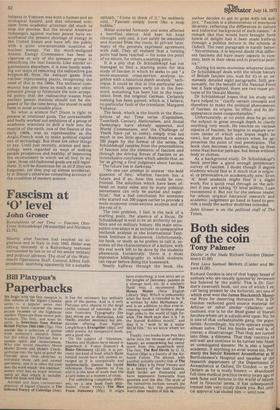Bill Platypus's
Paperbacks
We begin with the first mention in this column of the Signet Classics, series — a popular series that seems to have cornered the more arcane recesses of the highbrow market. There are three recent publications. The first, and most bizarre, is Selections from Recent British Fiction 1880-1900 (75p). This sounds like a collection of quotes; trom someone's research thesis, but the editor Ian Fletcher has a certain spirit and inventiveness. Who else would resurrect Menie Muriel Dowie and Hubert Crackanthorpe into the light of print? Mr Fletcher pens little sketches to introduce these odd and unread specimens, and it is often the case that the work which 'the tradition' passes over has as much intrinsic merit as that which it includes, Read the book and find out.
Another and more conventional selection of Signet Classics is The Selected Poetry of Coleridge (60p).
It has the necessary but Ordinary pick of the poems. And is it only Platypus who objects to the large circles instead of asterisks to denote footnotes, Typography like that drives me to distraction. And finally, another necessary but predictable • offering from Signet: Longfellow's Evangeline (40p), and other poems. An inexpensive book, and a good one. On the subject of ' literature,' Thames and Hudson have issued in paperback S. Foster Damon's A Blake Dictionary (£1.95). It is precisely the kind of book which Blake himself would have left unread, arranged as it is synoptically and systematically. Damon has traced references from Abarim to Zoa, and it is the kind of work that fills a card index at a moment of crisis.
For something completely different, try a new book from Mayflower. Frank Yerby's The Man From Dahomey (50p). It might
have everything: a love story set in the jungles of Dahomey, passion in a strange land,' etc. In a similarly florid vein, I recommend The Money Maker (New English • Library. 50p). Which is presumably what the book is intended to be. It is written by John McNamara Jr., and is an addition to that ever-increasing number of thrillers about high jinks in the world of high finance. The blurb says that it is "in the Harold Robbins mould," and that it is "soon to be a major MGM film," So we know where we are.
Finally, two books from Pan that delve into the recesses of military history; an unsurprising but canny move from this paperback mint. The first. The Red Devils by G. G., Norton (50p) is a history of the Airborne Forces. The second, with another suitably catchy title of The Micks (50p) is by Peter Verney and is a history of the Irish Guards. Both books are illustrated, and have impressive :forewords from generals and the like. The style of the narratives inclines toward the ponderous. • but this presumably won't deter readers of this ilk.






























 Previous page
Previous page